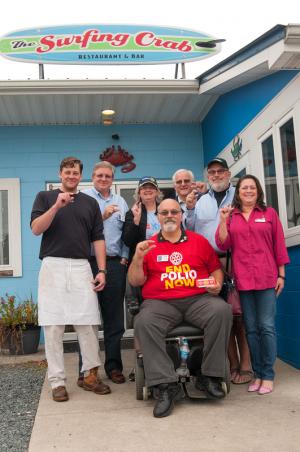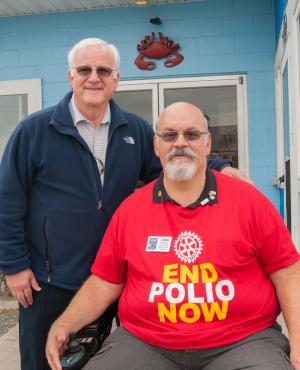Rotarians claw their way to polio eradication
Polio survivor Dave Keller picked up his hardshell crab and remembered his terrifying battle with polio in 1952, three years before the Salk polio vaccine was first administered.
“I was 8 years old and sitting at the dinner table, when suddenly I couldn’t move any muscles,” he said. I was rushed to Children’s Hospital in Washington, D.C., where I was diagnosed with paralytic polio. It was very scary. They burned all my clothes and put me in quarantine. I was not allowed to see my parents for three months. The disease affected everything from my knees to the base of my throat. The big fear was it would spread to my throat. If it did, I would have been placed in an iron lung to breathe. They set that huge iron lung machine next to my bed the entire time I was hospitalized. My hospital ward was lined with beds with kids with polio. After a while, the kids to my left and right were gone. I figured they went home. I later found out they had died."
Luckily, Keller made a full recovery. Keller was one of over 60 people who attended the Fifth Annual PolioPlus Crab Feast held at The Surfing Crab in Lewes, sponsored by the Area 41 clubs of District 7630. The Area 41 clubs are Georgetown-Millsboro, Lewes-Rehoboth, Long Neck Sunrise, Rehoboth Beach Sunrise and Southern Sussex. The Rotary fundraiser raised over $1,500 for polio eradication.
Polio is a contagious viral disease, especially in children, that attacks the central nervous system, and can result in paralysis. Keller’s scenario happened regularly in the United States until a solution was found in 1955 with the introduction of the polio vaccine. Polio was eradicated in most of the developed world by the mid '80s. In 1985 Polio was reduced to 350,000 new cases in 125 countries. Since Rotary clubs became involved, through their world-wide membership of 1.2 million members, they have raised money and awareness to battle the disease. Since then, Rotary has donated $1.4 billion to fight this dreaded disease, inoculating over two billion children in the process.
Polio survivor John Nanni (Class of 1953), paralyzed from his neck down for six months just prior to the Salk vaccine distribution, now uses a wheelchair for most of his daily mobility. John has given polio talks to all 41 Delaware Rotary clubs, district conferences, RYLA, Interact and Rotaract clubs throughout the northeast. Nanni was one of Rotary International PolioPlus representatives at the UN Special Session on Polio Eradication in 2012 and attended 2014 Rotary Day at the United Nations. Nanni is the District 7630 Polio Plus Chairman.
Today there are fewer than 300 new cases in only two countries, Afghanistan and Pakistan. The plan is to have polio eradicated in those countries by 2018. Polio is considered to be eradicated if there are no new cases in three years in any country. The biggest problem areas are in the tribal regions of Afghanistan and Pakistan, where religion, politics and a resentment of anything Western is keeping them from getting inoculated. The plan there is to reintroduce the inoculations through the Pakistani Rotary clubs.
“The Crab Feast went extremely well,” said Rotarian PolioPlus Coordinator for Area 41 Phil Allen. “ We raised over $1,500. Since each vaccine costs about 60 cents, we raised enough to buy 1,667 inoculations. Plus every dollar raised by Rotary gets a $2 match from the Bill and Melinda Foundation. So we really raised $4,5000.”






















































